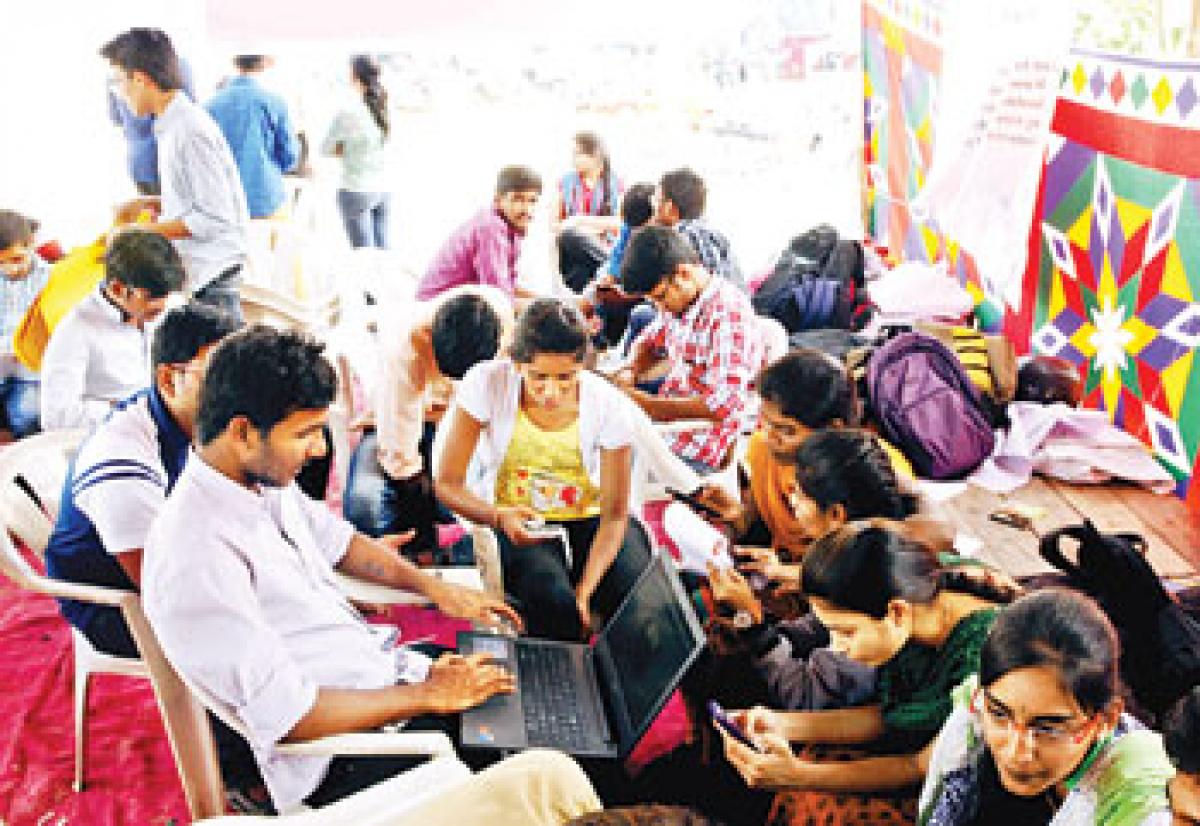Live
- ‘Hanging up my racquet. Thank you’ - India’s Prajnesh Gunneswaran retires from professional tennis
- Pawan Kalyan to Campaign for NDA Alliance in Maharashtra
- Eight killed, five injured in Nepal's traffic accident
- Technical snag grounds PM Modi's aircraft in Jharkhand
- Divya Pillai FL from ‘Bhairavam’ unveiled
- Tension in Lagcherla as BRS Leaders Allegedly Incite Landless Poor
- India vs South Africa 4th T20I Today: Know About Venue, Squad, Start Time, and Live Streaming Details.
- Abhishek says ‘sounds cool’ to be making a film about ‘someone who has 100 days to live’
- Samsung to buy back stock worth $7.16 billion to boost shareholder value
- ICC Champions Trophy 2025: Trophy tour to start from Islamabad on November 16; to travel to Karachi, Lahore and Rawalpindi
Just In

Months after the outcry for Net Neutrality, now the philanthropic-looking ‘Free Basics’ by Facebook, which aims to bring internet connectivity to the underprivileged in developing regions, has run into trouble.
 Standing tall against digital apartheid
Standing tall against digital apartheid
“People want connectivity, but what they do not know is that with Free Basics, connectivity is limited. Facebook tricked people into thinking they were signing the petition for Net Neutrality (and not against it). The thing is we have developers here and solutions as well. It is just that TRAI must also understand that we do not need Free Basics,”
- Prof. Pratap Reddy
“It works like a regular router abd can provide a wide range of free services including internet connectivity, voice calls, knowledge sharing platform and other communication and information tools. This technology can be extended to connect villages without Internet connectivity,”
- Sunil Mohan Adapa
Months after the outcry for Net Neutrality, now the philanthropic-looking ‘Free Basics’ by Facebook, which aims to bring internet connectivity to the underprivileged in developing regions, has run into trouble.
The Facebook petition for ‘Free Basics’ addressed to the Telecom Regulatory Authority of India (TRAI) has met with howls of protests from Net Neutrality supporters, who soon launched a counter-petition. The tech-driven start-up world in India had thrown its hat in the ring, too, with many coming out in support of Net Neutrality, again.
And, joining this protest are a few tech driven youngsters from the city. Developers of Swecha along with other affiliated organisations of Free Software Movement of India (FSMI) are on a four-day awareness campaign on Net Neutrality at a centre in Gachibowli that began on Saturday; the event enables people to send emails to TRAI.
“Contrary to what Facebook claimed, it doesn’t offer equal and unbiased access to all services. It, on the other hand is partnering with ISPs to provide preferential and selective access to a set of app developers and services, which is against the very basic concept of open Internet,” shared a techie during the event.
According to Facebook, Free Basics is an open platform that gives Indian developers the opportunity to make their services and websites available free-of-cost to those who cannot afford internet access. However, this free access is limited to partner websites and applications. Facebook’s petition tricked unsuspecting people into subscribing for its Free Basics prgoramme. This was even after TRAI withholding Free Basics mooted by Reliance Telecommunications in India.
“Even Sir Tim Berners Lee, the founder of Internet, has called upon to oppose internet.org to keep internet open,” said a techie at the event. The developers at the event demonstrated FreedomBox, a project which can be a solution to the whole predicament.
The solution to the hulla
FreedomBox is a personal server that protects privacy of internet users. It is a free software stack, a subset of the Debian universal operating system that can be installed in many flavours of cheap and power-efficient hardware.
“Providing truly free Internet connection need not involve surrendering our privacy, security and the very roots for the growth and success of Internet; net neutrality. When Internet connectivity is available to a village, it is possible to provide free Internet connectivity to everyone, which is not only unrestricted but, also provides many more useful services. Cheap and simple devices can achieve this, with the help of the government, village panchayats or collectives,” informed Sunil Mohan Adapa, one of the developers involved with FreedomBox.
FreedomBox, a device capable of providing such services, is the product of an international group of volunteers and the Free Software Movement of India.
“It works like a regular router abd can provide a wide range of free services including internet connectivity, voice calls, knowledge sharing platform and other communication and information tools. This technology can be extended to connect villages without Internet connectivity,” mentioned Sunil Mohan Adapa.
“FreedomBox has been successfully tested in a few villages in Warangal and we are planning to extend it to other parts of the country as well,” shared Siddharth, another techie. “The simplicity of setting up and operating a FreedomBox is similar to that of a Smartphone,” he added.
“People want connectivity, but what they do not know is that with Free Basics, connectivity is limited. Facebook tricked people into thinking they were signing the petition for Net Neutrality (and not against it). The thing is we have developers here and solutions as well. It is just that TRAI must also understand that we do not need Free Basics,” informed Prof. Pratap Reddy, faculty from JNTU who was present at the event.
Participants urged the government to uphold the basics of Net Neutrality, which are elementary to achieve the dream of ‘Digital India’. “Increase innovation, employment generation and avoid a ruthless approach to cyberspace,” he pleaded.

© 2024 Hyderabad Media House Limited/The Hans India. All rights reserved. Powered by hocalwire.com







